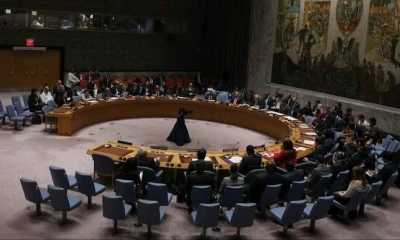Edited by Deepali Verma
The persistent Israel-Hamas conflict is hitting the safety of maritime commercial traffic in the Indian Ocean, including Bharat’s vicinity, directly affecting the country’s energy and economic interests, a top Bharatiya diplomat informed the UN Security Council members. The remarks by R Ravindra, the Deputy Permanent Representative of Bharat to the United Nations, came at the time of a UNSC Open Debate on the Middle East.
His remarks came as Houthi rebels stepped up their attacks on ships in the Red Sea.
“This stems great concern to the international community and has a direct bearing on Bharat’s own energy and economic interests. This fraught situation has no benefit of any party, and this must be explicitly recognised,” Ravindra said, without naming any Houthi rebels.
Concerns are continuously being raised over the safety of maritime traffic in the region. The Houthis claim that the attacks are in response to Israel’s war in Gaza and to mark their support for the Palestinians.
Ravindra remarked that the message that Bharat has conveyed since the commencement of this conflict is clear and consistent – it is significant to prevent escalation, to guarantee the continued delivery of humanitarian aid. The humanitarian situation’s address should be the top priority, he said, adding that Bharat welcomes the efforts of the UN and international community.
Bharat, he informed, has been engaging in delivering shipments of relief material to the Palestinian people in Gaza. We have provided a total of USD 5 million, out of which the USD 2.5 million we provided towards the end of December, to the United Nations Relief and Works Agency for Palestine Refugees in the Near East (UNRWA), which supports the Agency’s core programmes and services, such as education, healthcare, relief and social services granted to Palestinian refugees.
Reiterating Bharat’s stance for a Two-State solution where the Palestinian people live freely in an independent country amidst secure borders, with effective regard to the security needs of Israel, remarked Ravindar. Bharat is of a firm belief that precisely a Two-State solution, reached via direct and meaningful negotiations between both sides on final status issues, will facilitate the delivery of an enduring peace that the people of Israel and Palestine desire and deserve.
“To make this happen, we encourage all parties to de-escalate, eschew violence, while avoiding provocative and escalatory actions, and work towards creating conditions for an early resumption of direct peace negotiations,” he said.
Minister for Foreign Affairs and Expatriates of the State of Palestine Riyad Al-Maliki, remarked that Israeli leaders “do not look at our people as an empirical and political reality to coexist with, but rather as a demographic threat to do away with via death, displacement or subjugation”. On the other hand, Israel’s representative trying to shift the Council’s focus steered it towards addressing the real, significant security threats in the Middle East, which is “cancer”.
Stephane Sejourne, Minister for Europe and Foreign Affairs of France, Council President for January, addressing the Council said that there are two possible options. The first choice is of division, argument and fanning the flames — the choice of those who invade their neighbour. However, Sejourne’s choice would be to take the route of the second option, that is, to stand alongside both Israelis and Palestinians, for the peace and the good of both, which holds tough things for both sides.

















